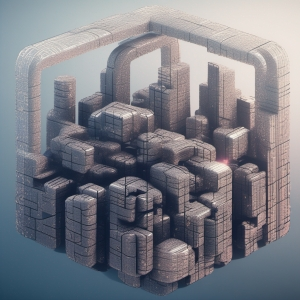Introduction: What is Blockchain?
In the simplest terms, a blockchain is a type of database. The name 'blockchain' is derived from the way it stores information, that is, in blocks that are linked together in a chain. Think of it as a digital ledger of transactions that is duplicated and distributed across an entire network of computer systems.
This technology uses decentralization and cryptographic hashing to provide a secure, public record of transactions. Literally, blockchain technology is a chain of digital 'blocks' that contain records of transactions. Each blockchain block contains a list of transactions. Once a block is filled with transactions, it is then chained to the previous block and so, a chain of blocks, i.e., a blockchain is formed.
The Best Mining Providers at a Glance
» Infinity HashFrom our perspective, currently the best mining provider on the market. With the community concept, you participate in a mining pool completely managed by professionals. A portion of the earnings are used for expansion and maintenance. We've never seen this solved as cleanly anywhere else.
» Hashing24A well-known and established cloud hosting company. With a good entry point and in a good market phase, a good ROI can also be generated with some patience. Unfortunately, we see the durations as a major drawback.
One of the key reasons why blockchain has gained such widespread admiration is its transparent nature. Blockchain technology is not limited to just enabling cryptocurrencies like Bitcoin and Ethereum but extends far beyond from enhancing operational efficiency of business processes to transparency in government systems and much more.
The future of blockchain technology is broad and full of possibilities. By understanding this technology, we can envision how it will shape our world in the coming years.
Growing Applications of Blockchain: Beyond Cryptocurrency
When most people hear the word 'blockchain', they often associate it with cryptocurrencies, particularly Bitcoin. However, the reach of blockchain technology extends far beyond the realm of cryptocurrencies. Today, blockchain is being used to revolutionize various sectors in unprecedented ways.
In the healthcare sector, blockchain is being utilized to ensure the security and privacy of patient data, while providing it in a readily accessible and immutable manner. In supply chain management, blockchain's transparency and tamper-proof nature are being leveraged to ensure product authenticity and traceability from source to end-user.
Furthermore, blockchain is proving its value in the finance sector beyond cryptocurrencies. Businesses are exploring blockchain for streamlining payments, reducing fraud, and cutting costs by eliminating intermediaries. In real estate, blockchain could potentially remove the need for costly intermediaries by enabling peer-to-peer transactions and improving transparency in the property transfer process.
These examples give us a glimpse of the many possibilities for blockchain applications beyond cryptocurrency. Its versatile nature means this technology is set to impact various aspects of our daily life, enhancing security, transparency, and efficiency.
| Pros | Cons |
|---|---|
| Decentralization: Blockchain technology offers a decentralized and democratized system | Scalability: The current leading blockchain technologies face issues when it comes to scaling. |
| Security: The cryptographic nature of the blockchain makes it virtually impervious to fraud and counterfeiting | Complexity: Blockchain technology is complex which makes it difficult for average users to understand. |
| Transparency: All transactions are public and transparent, which brings accountability | Power Consumption: Mining bitcoins requires tons of computational power, leading to huge energy consumption |
Potential Challenges and Implications for the Future
While the blockchain technology promises significant advances, it is not without its challenges. Regulating blockchain and identifying a comprehensive legal framework remains a challenge due to its decentralized nature. Furthermore, while blockchain enhances security, it is not completely immune to hacking, with the potential vulnerability lying primarily in the application layer.
Scalability is another pertinent issue facing blockchain technology's future. As blockchains grow in size, the demand for computing power, energy and storage also rises, thereby presenting potential sustainability concerns.
A major implication for the future of blockchain is the reshaping of entire industries. The adoption of blockchain in sectors like finance, health, and supply chain can give rise to new business models, enhance efficiency, and promote cost savings. This transformation, however promising, can be disruptive and would require change management strategies and a shift in thinking for it to be successful.
The future also holds an increased likelihood for collaboration between blockchain and other evolving technologies such as artificial intelligence and Internet of Things. Such synergy could potentially unlock new capabilities, thus expanding blockchain's application and value.
The societal implications of blockchain are vast. By offering trust, transparency and security, blockchain has the potential to reduce corruption, accelerate processes, and create a more equitable society.
Therefore, despite the challenges, the future of blockchain appears to be both promising and invigorating with the technology paving the way for innovative solutions and a potentially more transparent and secure digital future.
Blockchain: A Future Forecast

As we move into the future, the blockchain is poised to become a dominant technology. Several forecast trends give us a glimpse into how the use and impact of blockchain can expand.
Firstly, interoperability between different blockchains will become increasingly important. As multiple blockchain networks are established, the ability to share information and transactions between these networks will become a key area of focus allowing for greater collaboration and data sharing.
Secondly, the rise of blockchain-as-a-service (BaaS) is a crucial trend to watch. Major tech firms and startups alike are offering blockchain infrastructure for companies to build upon, saving them the cost and complexity of creating their own.
Next is the expanded use of smart contracts, which are automated agreements running on blockchain that execute when predefined conditions are met. This adoption will further automate processes across industries, particularly in the legal and financial fields.
Another forecast for the future is the growth of decentralized finance (DeFi), a field that uses blockchain and cryptocurrencies to recreate and disrupt traditional financial systems like loans and insurance. Blockchain’s transparency and immutability characteristics make it suited for facilitating loan agreements, insurance claims, and more.
The vast effects of blockchain will not happen overnight. With each industry adoption, with each start-up idea brought to life, with each government regulation passed; we advance one step closer to a future where blockchain technology becomes an integral part of our everyday lives. As we continue to explore the potential of this technology, the blockchain framework will be increasingly woven into the fabric of our digital lives.
In essence, blockchain technology, though still in its relative infancy, is one of the key tools we will be using to build our shared digital future. As we become more interconnected in this digital age, the blockchain will form the underpinning infrastructure that ensures security, transparency, and trust in our transactions and interactions.
Advancements and Innovations: Preparing for What's to come
The progressive nature of blockchain technology continues to inspire constant innovation and timely advancements. Architects and developers globally are relentlessly refining and upgrading blockchain platforms to enhance efficiency, privacy, and accessibility.
The coming years are likely to witness more focus on 'green' blockchains as concern over the energy consumed by blockchain, particularly Bitcoin, increases. Efforts will be directed at creating environment-friendly blockchain solutions without compromising the technology's innate benefits.
Furthermore, the theory of 'smart cities' powered by blockchain technology is gaining traction. These smart cities would leverage the decentralized blockchain system for everything from distributing energy to managing waste, thus revolutionizing our urban landscapes.
Also, anticipation is building around 'decentralized finance' (DeFi) facilitated by blockchain. Traditional finance has always relied on intermediaries such as banks and lenders. With DeFi, blockchain could democratize finance by creating an open-source, permissionless, and transparent financial service ecosystem accessible to everyone.
Another critical advancement is the concept of 'self-sovereign identity' on the blockchain. With this, users can store their identity data on their devices and provide it to those who require it without the need for an intermediary. This concept, if fully realized, could revolutionize the way we handle and secure personal data and identity.
These advancements embody the innovative spirit inherent in blockchain technology. As we brace for these future shifts, preparing for them requires staying informed, fostering agility, and understanding the transformative potential of the blockchain.
Conclusion: Embracing the Future of Blockchain

In conclusion, the blockchain holds incredible potential for our future. Tapping into this innovative technology today can lead to a more transparent, efficient, and secure digital age tomorrow. From healthcare to finance, and supply chain management, blockchain's versatility is poised to revolutionize countless sectors.
However, with the swift adoption of this technology, we must also brace for impending challenges. These include providing effective regulation, enhancing the technology's scalability, and ensuring sustainable energy use. Proper management of these issues is a hurdle that, once cleared, would pave the way for a more seamless integration of blockchain into our everyday lives.
A crucial takeaway is the importance of staying open and adaptable to new technologies like blockchain. Embracing it could mean paving the way to innovative solutions that shape and strengthen our digital future. Given the far-reaching potentials of the blockchain, there's no better time to delve into and understand this technology than in the present.
To embrace the future of blockchain is to brace for a future painted with the potentials of enhanced security, greater transparency, and unmatched efficiency. Moving forward, the journey in exploring blockchain's possibilities is bound to be a highly exhilarating one, shaping a future that will redefine the way we handle digital data and transactions.
FAQs: The Future of Blockchain: Predictions and Possibilities
1. What is the future of Blockchain technology?
Experts predict that Blockchain technology will become increasingly prevalent in financial transactions and asset management. Other industries such as healthcare, supply chain, and energy could also become more decentralized and secure through the use of blockchain.
2. What are possible uses of Blockchain?
Blockchain can be used for secure, transparent transactions, reducing fraud, increasing efficiency in supply chains, securely sharing medical records in healthcare, and in the energy sector for better usage rendering.
3. Can Blockchain be used in public services?
Yes, we expect more public services to adopt blockchain for tasks such as tax collection, issuing IDs and even voting systems due to its secure and efficient nature.
4. Will Blockchain become mainstream and when?
Yes, it is expected that Blockchain will be mainstream in the next 5-10 years. However, the speed at which it becomes mainstream will depend on various factors such as regulatory frameworks, societal acceptance, and technological advancements.
5. What industries could be most affected by Blockchain?
Financial services, supply chains, healthcare, and public services are some of the industries expected to be most affected by blockchain. It could bring about a transition to a more decentralized and transparent method of transactions.






